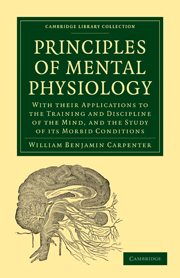 Principles of Mental Physiology
Principles of Mental Physiology Book contents
- Frontmatter
- PREFACE
- Contents
- BOOK I GENERAL PHYSIOLOGY
- BOOK II SPECIAL PHYSIOLOGY
- CHAPTER X OF MEMORY
- CHAPTER XI OF COMMON SENSE
- CHAPTER XII OF IMAGINATION
- CHAPTER XIII OF UNCONSCIOUS CEREBRATION
- CHAPTER XIV OF REVERIE AND ABSTRACTION:—ELECTRO-BIOLOGY
- CHAPTER XV OF SLEEP, DREAMING, AND SOMNAMBULISM
- CHAPTER XVI OF MESMEBISM AND SPIRITUALISM
- CHAPTER XVII OF INTOXICATION AND DELIRIUM
- CHAPTER XVIII OF INSANITY
- CHAPTER XIX INFLUENCE OF MENTAL STATES ON THE ORGANIC FUNCTIONS
- CHAPTER XX OF MIND AND WILL IN NATURE
- APPENDIX. DR. FERRIER'S EXPERIMENTAL RESEARCHES ON THE BRAIN
- INDEX
CHAPTER XII - OF IMAGINATION
Published online by Cambridge University Press: 29 August 2010
- Frontmatter
- PREFACE
- Contents
- BOOK I GENERAL PHYSIOLOGY
- BOOK II SPECIAL PHYSIOLOGY
- CHAPTER X OF MEMORY
- CHAPTER XI OF COMMON SENSE
- CHAPTER XII OF IMAGINATION
- CHAPTER XIII OF UNCONSCIOUS CEREBRATION
- CHAPTER XIV OF REVERIE AND ABSTRACTION:—ELECTRO-BIOLOGY
- CHAPTER XV OF SLEEP, DREAMING, AND SOMNAMBULISM
- CHAPTER XVI OF MESMEBISM AND SPIRITUALISM
- CHAPTER XVII OF INTOXICATION AND DELIRIUM
- CHAPTER XVIII OF INSANITY
- CHAPTER XIX INFLUENCE OF MENTAL STATES ON THE ORGANIC FUNCTIONS
- CHAPTER XX OF MIND AND WILL IN NATURE
- APPENDIX. DR. FERRIER'S EXPERIMENTAL RESEARCHES ON THE BRAIN
- INDEX
Summary
395. The form of Ideational activity which we distinguish as Imagination, has the same basis as that which exerts itself in Reasoning processes ; but works in a very different manner. In its lowest and simplest exercise, Imagination, or the image-making power, consists in that reproduction of the mental “idea” or representation of an object formerly perceived through the senses, which is more generally understood by the term Conception. In strict language, every such reproduction of an image, however distinctly traceable to the laws of Association, is an act of Imagination. This, however, is not the generally understood meaning of the term ; which is usually applied to the faculty by which, in the first place, the materials supplied by experience or direct apprehension are recombined in such forms as to gratify the sense of beauty or fitness, rather than to satisfy the reason ; and by which, in the second place, some higher form of Beauty than experience has ever presented, or some more profound Truth than reason could bring within our grasp, is discerned by direct” insight,—the “vision and the faculty divine.” Thus we may distinguish between the constructive and the creative Imagination; and each may be exercised in every department of Human knowledge, whether relating to external Nature or to Human nature.
- Type
- Chapter
- Information
- Principles of Mental PhysiologyWith their Applications to the Training and Discipline of the Mind, and the Study of its Morbid Conditions, pp. 487 - 514Publisher: Cambridge University PressPrint publication year: 2009First published in: 1874


